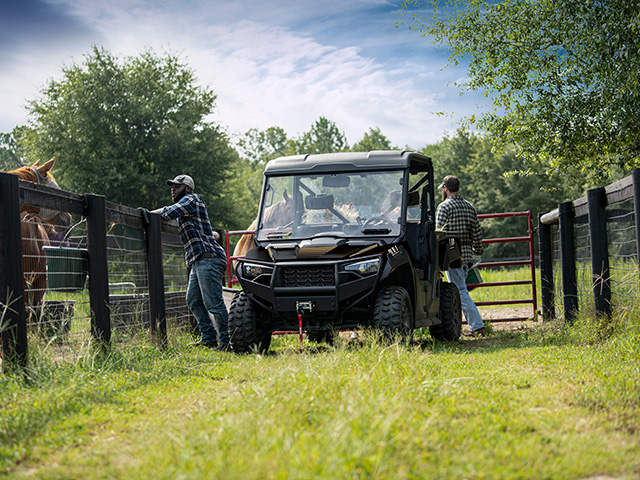MachineryLink
Deere, Cargill Team on Regenerative Ag Program; Arctic Cat Releases New Prowler; Mississippi State Launches Autonomy Institute
In this Equipment Roundup, DTN/Progressive Farmer looks at Arctic Cat releasing a new Prowler, Deere and Cargill collaborating on sustainability, Deere buying Smart Apply, and Mississippi State opening a new autonomy research center.
**
NEW PROWLER ON THE LOOSE
Arctic Cat is rolling out a new Prowler Pro Ranch Edition that includes a 4,500-pound WARN winch, premium front and rear bumpers for extra protection and durability, and more than 50 custom-built accessories.
With three- or six-passenger options, the Prowler features pre-installed electrical wiring, a standard 75-amp alternator and a ROPS that provides easy installation of cab components.
The Prowler Pro Ranch Edition features 12.5 inches of ground clearance, a 2,000-pound towing capacity and 1,000-pound bed capacity. The Prowler Pro Ranch Edition is powered by a 50-horsepower engine.
For information, visit www.arcticcat.com.
**
CARGILL, DEERE TEAM ON SUSTAINABLE PROGRAM
Cargill and John Deere have announced a collaborative effort to streamline the digital and in-field experience for farmers using John Deere technology and electing to participate in the Cargill RegenConnect program.
P[L1] D[0x0] M[300x250] OOP[F] ADUNIT[] T[]
Cargill RegenConnect provides farmers with a financial incentive for positive environmental outcomes through the adoption of regenerative agriculture practices, while helping to improve soil health and decarbonize the agriculture supply chain. John Deere's precision ag technology and digital platform, Operations Center, helps farmers to implement and document the practices they choose to adopt as part of Cargill RegenConnect.
Farmers will be able to use existing planting, harvest and tillage documentation data stored in the Operations Center and enroll in the 2023 Cargill RegenConnect program.
The Cargill RegenConnect program is available to all Operations Center users in 24 U.S. states. Farmers will be able to work directly with their John Deere dealer to learn about equipment and technology available to implement practices eligible under the Cargill RegenConnect program and to ensure the as-applied documentation data is complete.
Cargill RegenConnect is in its third year. This program pays farmers for improving soil health based on the regenerative agriculture practices they have adopted, including cover crops, no-till or reduced till. Eligible acres must have a primary crop of corn, soy, wheat or cotton.
Enrollment in the 2023 Cargill RegenConnect program is open through Sept. 15.
To enroll, visit www.cargillregenconnect.com. For more information, contact your local John Deere dealer or visit http://sustainability-programs.deere.com/….
**
DEERE BUYS SMART APPLY
Deere & Company has acquired Smart Apply Inc., a precision spraying equipment company based in Indianapolis, Indiana.
The company developed the Smart Apply Intelligent Spray Control System, an upgrade kit that can improve the precision and performance of virtually any air-blast sprayer used in orchard, vineyard or tree nursery spraying applications. Smart Apply helps growers reduce chemical use, airborne drift and runoff.
LiDAR (light detection and ranging) technology senses the presence of individual trees and vines and automatically adjusts spray volume based on foliage density to optimize protection. The system stops spraying between trees and rows, adjusting without human intervention. Smart Apply's precision spraying helps achieve up to 93% less chemical runoff and up to 87% reduction in airborne drift, while reducing chemical use an average of 50%.
Smart Apply is primarily sold through John Deere dealers in the U.S., Australia, New Zealand, South Africa, Canada and England.
**
MSU LAUNCHES AUTONOMY INSTITUTE
Mississippi State University is opening the doors to its new Agricultural Autonomy Institute, giving a new research home to the cutting-edge technologies farmers and ranchers are encountering in their business worlds.
"The global agricultural autonomy market is expected to more than double in the coming years from $5 billion in 2021 to $12 billion by 2026," said Alex Thomasson, professor and head of the Department of Agricultural and Biological Engineering. "MSU has a tradition of excellence in agriculture research and the advanced technologies that are driving agricultural autonomy. That leadership position will continue to grow as we launch the first institute in the U.S. dedicated to this emerging field."
In the short term, the MSU Agricultural Autonomy Institute aims to minimize the impacts of farm labor shortages while maximizing on-farm precision and efficiency to enhance profitability. Long-term goals include developing sensing and analytic capabilities of autonomous machines to make input decisions in the field at the level of a square meter or even a single plant.
The Agricultural Autonomy Institute is a joint effort helmed by the MSU Department of Agricultural and Biological Engineering within the College of Agriculture and Life Sciences and the James Worth Bagley College of Engineering.
Dan Miller can be reached at dan.miller@dtn.com
Follow him on Twitter @DMillerPF
(c) Copyright 2023 DTN, LLC. All rights reserved.






Comments
To comment, please Log In or Join our Community .